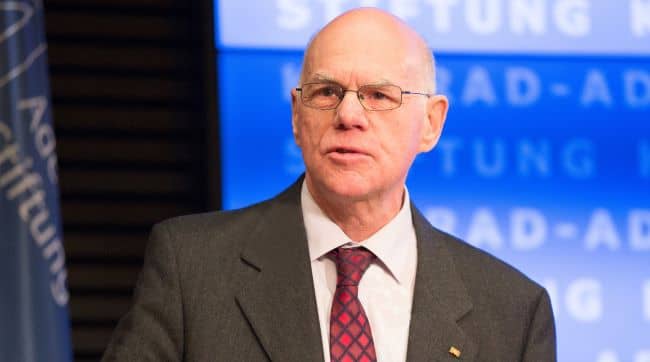Prof. Norbert Lammert, German Federal Parliament Speaker (2005-2017) and Chairman of the Konrad Adenauer Foundation, addressed an online event in Germany on October 8, 2020, to draw attention to the human rights abuses in Iran.
Gathering in Berlin on the World Day Against the Death Penalty. The Online Conference Marking World Day Against the Death Penalty.
Dozens of German MPs and dignitaries joined an online conference.
The conference was under the title, Iran: Executions Means of Keeping Power, Stop Massacre of Protesters, The European Duty.
The event was hosted by the National Council of Resistance of Iran (NCRI), in which participants strongly condemned the mullahs’ increase in human rights violations.
The event was attended by cross-party Members of Germany’s Bundestag (parliament) and European dignitaries.
Mrs. Maryam Rajavi, the President-elect of the National Council of Resistance of Iran(NCRI), was the keynote speaker at this conference.
The panelists urged the European Union to end its policy of appeasement toward the regime and support the Iranian people’s desire for a free and democratic country.
The supporters of the NCRI and the People’s Mojahedin Organization of Iran (PMOI / MEK) also gathered in front of the “Reichstag” building in Berlin at the same time to protest against the recent executions in Iran, demanding the EU stand with the Iranian people and their Resistance in the struggle for freedom and to end the policy of appeasement toward the ruling regime in Iran.
Prof. Norbert Lammert, German Federal Parliament Speaker (2005-2017) and Chairman of the Konrad Adenauer Foundation
The execution of Navid Afkari and Mostafa Salehi led to international outrage and focus on this regime. This regime is criminalizing any kind of resistance and prosecuting political dissidents.
During last year’s national protests we saw thousands of detentions. Even the parliament and Interior Ministry have admitted to the high number of people who have been killed and detained.
Human rights is a commitment of any civilized state. The systemic violation of human rights in Iran is not a matter of domestic policy. If the government can’t protect its citizens and their human rights, then other governments have a responsibility to protect their human rights.
